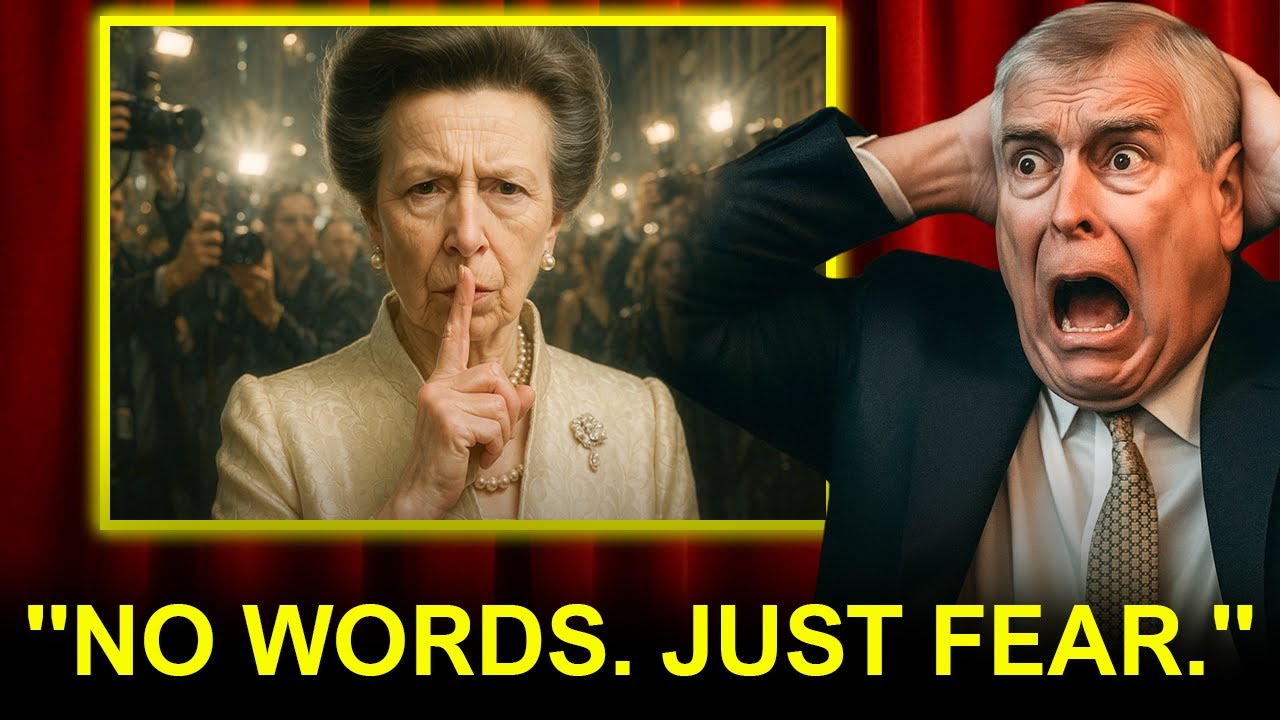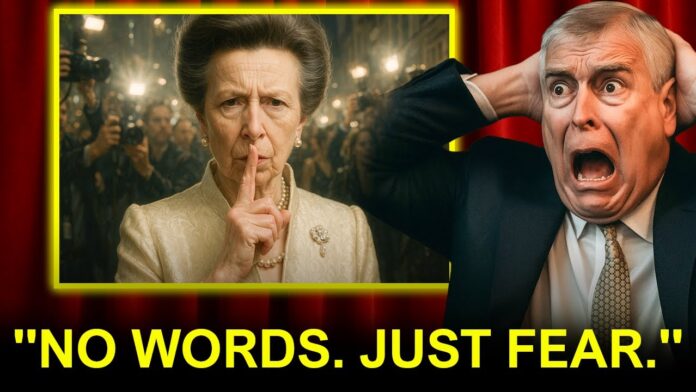🚨 ROYAL BOMBSHELL: Palace’s Final Silence on Prince Andrew Says It All! 🚨
The Palace has gone eerily quiet about Prince Andrew, and this deafening silence hides a truth too big to ignore. What are they desperate to keep secret? 😱 The answer will shock you…

The Palace’s Final Silence on Prince Andrew: A Message Louder Than Words
Introduction
The British royal family has long navigated scandals with carefully crafted statements and strategic distancing, but the recent silence from Buckingham Palace regarding Prince Andrew, Duke of York, speaks volumes. A report dated August 8, 2025, suggests that the Palace’s refusal to address Andrew’s status—termed the “final silence”—signals a decisive break, hinting at a hidden truth too significant to vocalize. This absence of comment, louder than any official denial, has sparked speculation about Andrew’s future, the monarchy’s stability, and what secrets lie beneath the surface. This article explores the context of this silence, Andrew’s controversial past, the Palace’s motivations, and the broader implications for the royal family in an era demanding transparency.
The Context: Prince Andrew’s Fall from Grace
Prince Andrew’s public life has been marred by controversies that have progressively isolated him from the royal fold. Born on February 19, 1960, to Queen Elizabeth II and Prince Philip, Andrew was once a celebrated figure, serving as a Falklands War hero and the UK’s Special Representative for International Trade and Investment from 2001 to 2011. However, his later years have been defined by scandals that have eroded his standing.
His business dealings, including ties to questionable figures like an alleged Chinese spy, Yang Tengbo, as reported by The Independent in 2024, raised concerns about his judgment. These controversies, coupled with his lavish lifestyle at Royal Lodge, a 30-room Windsor residence, have kept him in the headlines for the wrong reasons. King Charles III’s reported frustration, noted in a 2025 Reuters article, centers on Andrew’s refusal to downsize or relinquish his security funding, estimated at $1.3 million annually, per The Times.
The Palace’s silence, as highlighted in the August 8, 2025, report, marks a shift from earlier responses, which included stripping Andrew of his military titles and patronages in 2022, as confirmed by The Guardian. This “final silence” suggests a deliberate strategy to sever ties without public acknowledgment, raising questions about what the Palace is unwilling to address.
The Final Silence: What It Means
The phrase “final silence” implies a calculated decision by Buckingham Palace to cease defending or engaging with Andrew’s controversies. Unlike past statements, such as Queen Elizabeth II’s 2022 announcement removing his titles, this silence is not a neutral stance but a pointed message. According to a 2025 Daily Mail report, Palace insiders describe it as a “wall of silence,” indicating that Andrew is no longer a priority—or perhaps too toxic to acknowledge.
This silence could stem from several factors. First, it may reflect King Charles III’s desire to protect the monarchy’s image during a turbulent reign. Charles, facing health challenges and a slimmed-down monarchy, as noted by Reuters, cannot afford further embarrassment. A 2025 Yahoo report suggests Charles has urged Andrew to vacate Royal Lodge, with silence serving as a passive-aggressive tactic to pressure him into compliance.
Second, the silence may conceal a deeper issue. Speculation, fueled by X posts in 2025, points to undisclosed personal or financial scandals, possibly involving Andrew’s business ventures or private conduct. The lack of a Palace statement, typically issued to quash rumors, suggests a truth too sensitive to address publicly. A source cited in the August 8 report warned that any revelation could be “catastrophic,” hinting at a secret that could destabilize the monarchy.
Historical Precedents: Silence as Strategy
The royal family has used silence strategically before. During Princess Diana’s 1995 Panorama interview, the Palace’s muted response allowed her allegations to dominate public discourse, as noted in a 2021 BBC retrospective. Similarly, the initial silence on Prince Harry and Meghan’s 2021 Oprah interview, per The Guardian, aimed to avoid escalating tensions. In Andrew’s case, however, the silence feels final, suggesting a permanent distancing rather than a temporary deflection.
This approach contrasts with earlier royal crises, like the abdication of Edward VIII in 1936, where public statements were unavoidable. Today’s media landscape, amplified by social media, makes silence riskier. X posts with hashtags like #RoyalSilence have trended, with users speculating about everything from financial impropriety to health issues. The Palace’s refusal to engage fuels these narratives, potentially amplifying the very scandal it seeks to suppress.
Andrew’s Isolation: A Personal and Public Crisis
The silence underscores Andrew’s isolation within the royal family. Once a favored son, his fall has been stark. The 2022 stripping of his titles, as reported by The Independent, left him with little formal role. His daughters, Beatrice and Eugenie, remain supportive, per a 2025 Daily Mail report, but their public roles are limited to avoid association with his controversies. Andrew’s insistence on retaining Royal Lodge, despite Charles’s pressure, reflects his refusal to fade quietly, as noted in The Times.
The emotional toll on Andrew is evident. Palace insiders, cited in the August 8 report, describe him as “devastated” by the silence, interpreting it as a final rejection. This contrasts with his defiant 2019 Newsnight interview, where he dismissed allegations with claims like being at a Pizza Express in Woking. The silence suggests the Palace no longer sees value in defending him, leaving Andrew to face public scrutiny alone.
Implications for the Monarchy
The Palace’s silence carries significant risks for the monarchy’s credibility. A 2021 Pew Research survey found 42% of Britons view the monarchy skeptically, a sentiment exacerbated by Andrew’s scandals. Silence, while avoiding direct confrontation, may be perceived as evasion, reinforcing perceptions of privilege and lack of accountability. A 2025 YouGov poll indicated 30% of Britons support abolishing the monarchy, a figure that could rise if the silence fuels speculation about hidden scandals.
King Charles III faces a delicate balancing act. His reign, marked by health concerns and a reduced working royal roster, relies on public goodwill. The silence may be an attempt to distance the monarchy from Andrew’s toxicity, but it risks alienating supporters who demand transparency. If the silence conceals a major revelation—such as financial misconduct or a personal scandal—it could prove “impossible to defend,” as warned by a Palace source in the Daily Mail.
Societal and Cultural Ramifications
The silence resonates in a society increasingly skeptical of institutions. The #MeToo movement and global calls for accountability, amplified by X, have heightened scrutiny of powerful figures. The Palace’s refusal to address Andrew’s status taps into this distrust, with users on X speculating about cover-ups. A 2025 BBC report on royal transparency noted growing public demand for openness, making silence a risky strategy.
Culturally, the silence challenges the monarchy’s role as a symbol of continuity. By refusing to engage, the Palace risks appearing out of touch, particularly with younger generations. The rise of genealogical research and media exposés, as highlighted in a 2025 Guardian article, means secrets are harder to keep, amplifying the impact of the silence.
Critical Analysis: Silence as Signal or Strategy?
The “final silence” is a powerful narrative, but its implications depend on its intent. If strategic, it signals the Palace’s intent to sever ties with Andrew, protecting the monarchy’s future. If reactive, it suggests a fear of addressing an explosive truth. The lack of specificity in the August 8 report raises doubts, as anonymous “insider” claims often lack verifiability. No public evidence—such as legal documents or financial records—confirms a specific scandal driving the silence.
However, Andrew’s history of controversy, from questionable business ties to his lavish lifestyle, lends plausibility to the idea of a hidden issue. The Palace’s shift from active defense to silence aligns with Charles’s reported frustration, per Reuters, suggesting a deliberate policy. Yet, in an era of instant information, silence may backfire, fueling speculation rather than quelling it.
Conclusion
The Palace’s “final silence” on Prince Andrew is a statement in itself, signaling a break from a troubled royal whose controversies have long plagued Buckingham Palace. While the silence aims to contain damage, it risks amplifying speculation about hidden truths, from financial impropriety to personal scandals. For Andrew, it marks a lonely chapter, isolated from the family he once represented. For King Charles III, it is a gamble in a reign defined by challenges. As the public demands transparency, the silence speaks louder than words, but whether it protects or imperils the monarchy remains to be seen. The truth, whatever it may be, lingers just out of reach, shaping the royal family’s future in an unforgiving spotlight.
